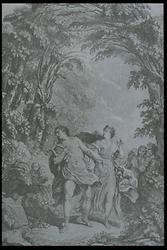Viennese Classic - Early Period#
Christoph Willibald Gluck: Orfeo ed Euridice#
Orfeo ed Euridice is the first so-called Reform Opera, that Christoph Willibald Gluck (1714 Erasbach/Oberpfalz - 1787 Vienna) created together with the Italian librettist, Ranieri di Calzabigi in 1762. Gluck turned his back on the stiff conventions of the High Baroque Period and particularly against those of the operas on texts by Metastasio. These typically required many, unrealistic Da capo-arias that held up the action and were often written especially for a particular singer, as well as an artificial storyline which could only be resolved by a Deus ex machina. For Gluck, the texts and the characters should present dramatic and psychological truthfulness, whereby the music served not only these texts but also the content of the play. The explanation for the happy end that is brought about by a higher power in this opera is that it was destined for a festive performance. (E. Stadler)Sound Clip#
© Otto Preiser & Co. Ges.m.b.H., Wien, CD-Nr. Fono PR 89082
